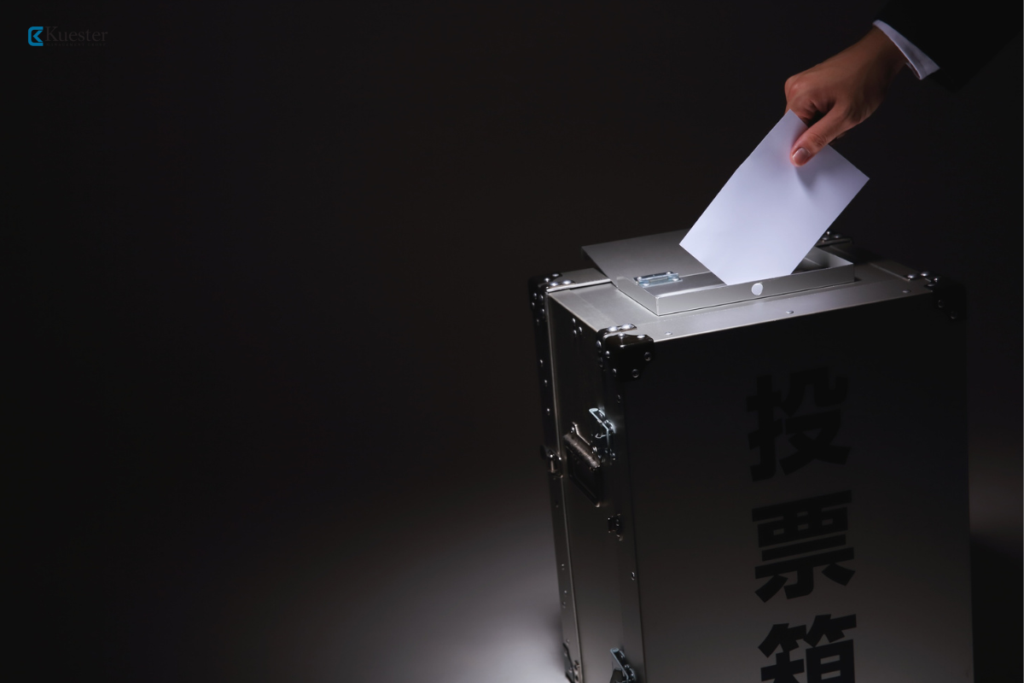Contents
In community associations, few topics create more confusion than proxy voting. While most homeowners are familiar with using proxies during annual meetings, many are surprised to learn that different rules often apply to HOA board members.
Can board members vote by proxy when they can’t attend a meeting? What does your association’s governing document actually say about it? And what happens if your HOA allows improper proxy votes?
At Kuester Management Group, we help communities across the Carolinas navigate questions like these each and every day. Our team ensures that all meetings, elections, and board decisions comply with both governing documents and state laws. Our HOA management services in Charlotte, Huntersville NC, Wilmington NC, Myrtle Beach SC, and Fort Mill SC promote transparency, consistency, and legal compliance in every aspect of governance.
What Is a Proxy Vote?
A proxy vote allows one person to authorize another to vote on their behalf. In an HOA setting, this is most common among homeowners, who may not be able to attend an annual or special meeting but still want their vote counted.
The proxy authorizes another individual (often another homeowner) to represent their interests for specific agenda items or elections.
However, when it comes to HOA board members, the rules are much more restrictive. Proxy voting for board business is typically prohibited, unless explicitly allowed in the governing documents or by state law.
Homeowner Proxies vs. Board Member Proxies
It’s important to distinguish between homeowner proxies and board member proxies, as they are often confused.
- Homeowner Proxies
- Commonly used in annual membership meetings or special votes.
- Allow homeowners to participate even if they cannot attend in person.
- Must comply with specific notice, signature, and time-limit requirements.
- Board Member Proxies
- Governed by the association’s bylaws and applicable state statutes.
- Often not permitted, because board decisions must be made collectively during official meetings.
- When prohibited, a board member must be physically present (or attend via approved remote means) to cast their vote.
This distinction protects the integrity of board decisions and ensures that every director has access to the same discussion and information before voting.
Why Most HOAs Restrict Proxy Voting by Board Members

At first glance, proxy voting might seem like a convenient solution, especially when board members have conflicting schedules. But allowing it can create serious governance and legal issues.
Here’s why most associations and states prohibit or limit proxy votes for board members:
- Lack of Transparency: Decisions must be discussed openly during properly noticed board meetings. Proxy votes can appear secretive or prearranged.
- Informed Decision-Making: Board members are expected to deliberate, ask questions, and evaluate details before voting. A proxy can’t replicate that process.
- Legal Compliance: Many state HOA laws, such as those in North Carolina and South Carolina, require board actions to be taken in meetings with quorum and participation. Proxy votes may invalidate decisions.
- Accountability: Serving on the board of directors means being responsible for one’s own votes and decisions. Proxies can blur lines of responsibility and create liability issues.
In short, while homeowners may vote by proxy in specific circumstances, board members generally cannot–and should not–delegate their voting authority.
What Your Governing Documents Say
Every HOA’s governing documents–its Bylaws and Covenants, Conditions & Restrictions (CC&Rs)–outline the rules for how the board of directors conducts business.
Here’s what to look for:
- Explicit Language on Proxy Voting: Check if the bylaws mention board member proxies. If the section on board meetings is silent, assume they are not allowed.
- Quorum Requirements: Proxies generally don’t count toward quorum for board meetings unless explicitly stated.
- Remote or Electronic Participation: Many modern HOAs allow board members to attend meetings via video or phone call, which is a legal alternative to proxy voting.
- State Law Compliance: State HOA statutes take precedence over bylaws. Even if your documents allow proxies, they may still be prohibited by state law.
When in doubt, consult with your HOA attorney or a professional management company like Kuester to ensure compliance.
Scenarios Where Proxy Voting Might Arise
While rare, some communities attempt to use proxies in board settings. Common scenarios include:
- A board member cannot attend a budget vote and asks another director to cast their vote.
- The board uses a written proxy form to approve an emergency expense without meeting.
- A well-meaning board chair collects proxy votes to “speed up” decision-making.
Unfortunately, each of these actions could invalidate the vote or expose the association to legal challenges related to proxy abuse.
Best Practices for Compliant Voting
To ensure fair and compliant voting within your HOA board, adopt these best practices:
- Require Attendance for Votes: Board members should attend (in person or virtually) to cast votes.
- Use Written Consents When Permitted: Some states allow written unanimous consent for urgent matters–verify if your bylaws support this.
- Document Everything: Record votes and attendance in meeting minutes. Transparency protects the board and the community.
- Train Board Members: Ensure all directors understand their legal and ethical responsibilities before they take office.
- Encourage Participation: Schedule meetings at convenient times and provide remote attendance options when possible.
These practices help prevent disputes, protect the board’s decisions, and maintain confidence among association members.
Consequences of Improper Proxy Voting

Allowing proxy voting when it’s not permitted can lead to significant problems, including:
- Invalid Decisions: Actions approved through improper voting may be overturned or deemed unenforceable.
- Legal Challenges: Homeowners may file complaints or lawsuits alleging violation of governing documents or state laws.
- Loss of Trust: Perceived favoritism or secrecy damages the community’s confidence in the board.
- Potential Liability: Board members who authorize or rely on proxy votes in violation of the bylaws may face personal liability.
For these reasons, it’s essential to confirm your community association’s rules and follow proper procedures before any vote is cast.
How Kuester Management Group Ensures Compliance and Transparency
At Kuester Management Group, we guide HOA boards through the complexities of governance, compliance, and fair decision-making. Our experienced managers help communities avoid costly mistakes and maintain transparency by:
- Reviewing bylaws and CC&Rs to clarify voting and quorum requirements.
- Scheduling and documenting meetings in compliance with state laws.
- Ensuring all voting– no matter if it’s in person, virtual, or by written consent–meets legal standards.
- Providing board training and policy guidance to prevent procedural errors.
- Offering communication tools that keep homeowners informed and confident in board leadership.
We’ve helped communities throughout the Carolinas establish strong, compliant governance structures that protect both the board and the homeowners they serve.
If your association is uncertain about voting rules, meeting protocols, or compliance, Kuester Management Group can help you navigate with confidence. We provide expert HOA management in both North Carolina and South Carolina. Reach out and schedule a one-on-one consultation with a member of our team today!
FAQ
Can board members legally vote by proxy in an HOA?
Generally, no. Most bylaws and state laws prohibit board members from using proxies for official votes.
Are homeowner proxies different from board member proxies?
Yes. Homeowners may use proxies for membership meetings, while board members usually must attend meetings to vote.
What does the HOA’s governing document usually say about proxies?
The bylaws typically specify whether proxies are allowed and under what conditions. If silent, they’re usually not permitted.
How do proxies impact quorum and meeting validity?
Proxies may count toward quorum in homeowner meetings but rarely in board meetings. Improper use can invalidate votes.
What happens if a proxy vote is challenged?
If challenged, the decision could be overturned or require a revote, potentially exposing the HOA to legal or financial risks.
Are electronic proxies allowed for HOA meetings?
Some states and associations allow electronic proxies for homeowner votes, but not for board actions. Always verify state law.
How can board members ensure they comply with proxy voting laws?
By reviewing governing documents, consulting legal counsel, and working with a professional HOA management company like Kuester for ongoing guidance and compliance.

